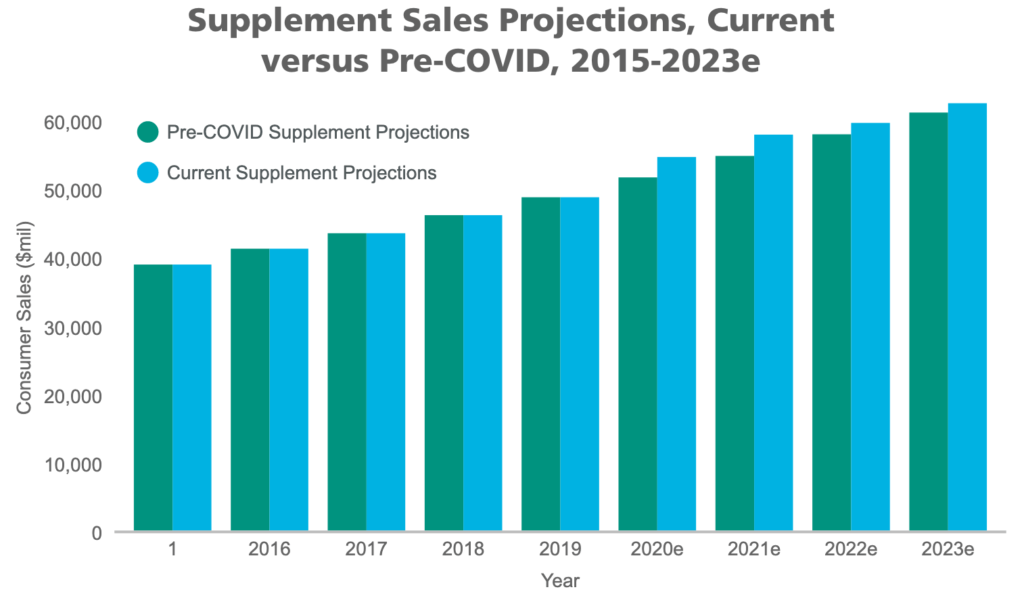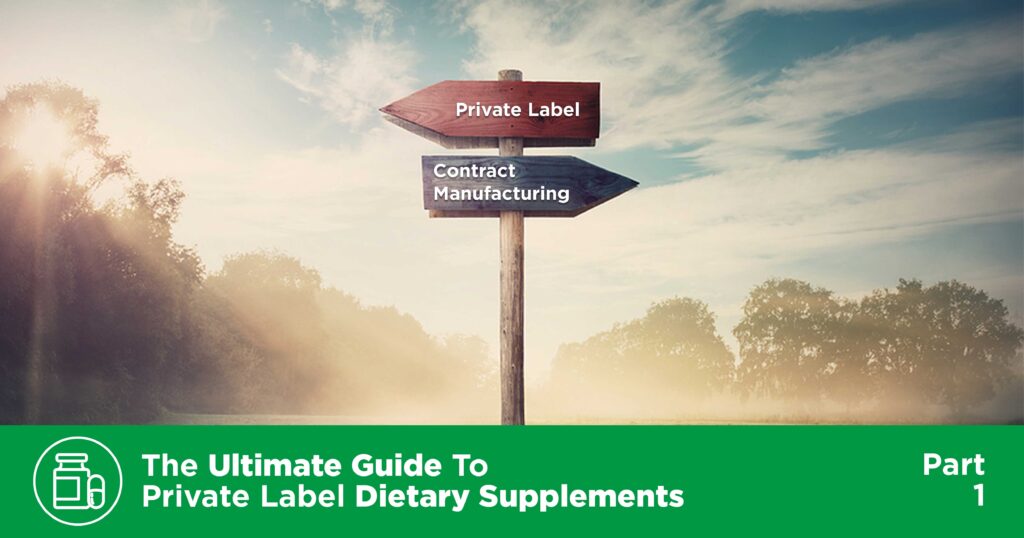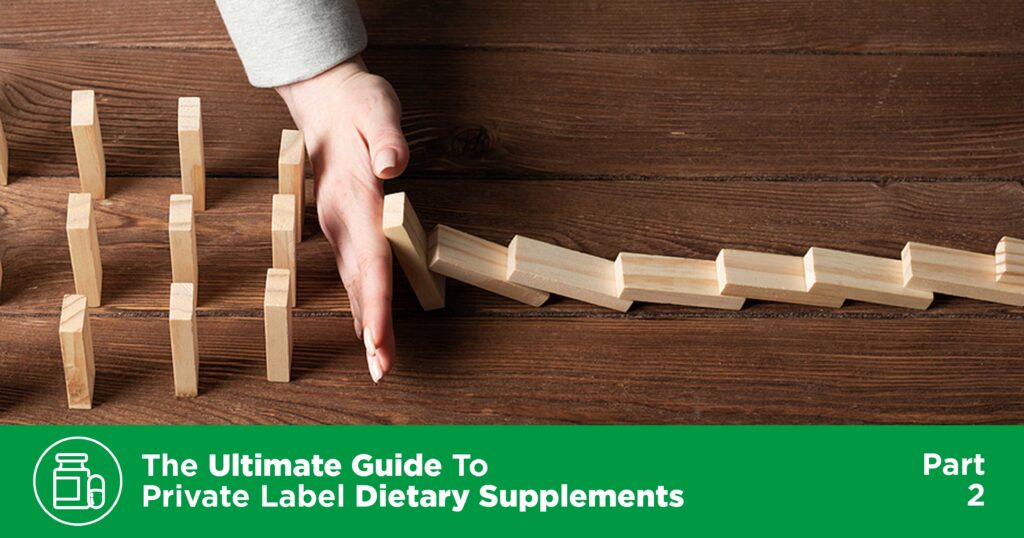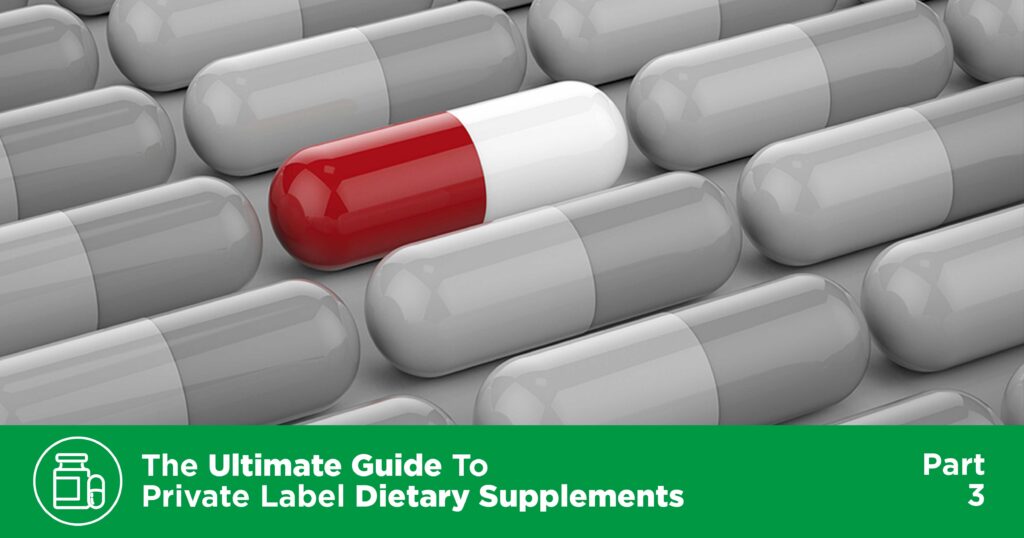This is part of our Ultimate Guide to Private Label Dietary Supplements, a complete overview of the key advantages of utilizing a private label program, the differences between private label and contract manufacturing, the biggest risks new brands might face, and the top 10 factors you should consider when choosing your private label supplement manufacturer.
There are many reasons people choose to launch their own private label dietary supplement brand.
Those with a lifelong passion for health and wellness might view it as a passion project – there is ample science showing the many ways plants have been used for the prevention or remedy of various health conditions throughout history, and new discoveries are made every day. Others may just have a strong business acumen, and see the financial opportunity of entering this ever-growing industry. According to Grandview Research, the supplement industry is projected to be worth $194.63 billion by 2025!
There are as many different ways to enter this market as there are reasons to. In this post, we will outline the smartest, safest, and simplest way to get started with your own private label dietary supplement brand.
Make Sure Private Labeling Is Right For You
In previous posts, we have talked about the evolution of private label supplements – from cheaply made, generic knock-offs to often higher quality, better value – and the shift in consumer perception about the quality and value these products can offer. We also laid out the 3 biggest risks involved in launching a dietary supplement brand, and outlined how the advanced speed-to-market of a private label program can be advantageous.
Let’s assume that at this point you have made the choice to kick off your brand with private label supplements. There are some simple, specific steps you will want to follow in order to make sure you smoothly and successfully launch your brand.
6 Steps to Private Label Success With Dietary Supplements
1. Understand Your Brand
What characteristics will define your brand? Will your products be Vegan or Organic? Are you targeting athletes or women? You will want to have a good idea of who you will be selling your products to and what they care about.
Starting your business by understanding what your brand is all about will influence every other step of your business plan, from what products you decide to carry to what the products should look like. For example, if you want to create a vegan line, but you also only want to offer gummy supplements, you will most likely have some work to do. Although vegan gummies exist, and private label gummies exist, it might be difficult to find a private label gummy manufacturer who offers vegan gummies.
Deciding what your brand will be about right away will make all of the following decisions much easier.
2. Create Your Brand Image
If you don’t already have a logo for your business, then this is what you will want to do next. As Creative Bloq says, “logo design is just one small subset of branding, but the logo or brand mark remains the centerpiece of most branding schemes.” Whether you design this yourself, have a family member or friend do it, or use one of the many design services out there – fiverr, for example – you’ll want to create a unique logo that represents your brand.
If your target audience is women and moms-to-be, for example, you might not choose to go with a giant flexing bicep as your logo. Or the very common and somewhat aggressive black-and-red or black-and-yellow color scheme you see on many of the products targeting male bodybuilders. You want your branding to carry the correct tone through whatever medium your branding will be viewed, be it the product label, your website, or a social media page, etc.
Whatever private label manufacturer you choose should be able to incorporate your logo into the label along with all of the appropriate, FDA-compliant product information. As we discussed in our previous blog post, How to Manage the 3 Biggest Risks of Offering Private Label Supplements, using the pre-approved labeling system provided by the manufacturer ensures that you don’t put your brand at risk by having incorrect (or illegal) information on your products.
3. Plan How You Will Market and Sell Your Products
Next, you will want to give some thought as to how you will best reach your target audience. For example, if your brand is going to be aimed at supporting the needs of an older consumer, you probably won’t choose to launch a heavy Instagram marketing campaign, as that isn’t where those consumers usually spend their time.
Once you have decided where you’ll be selling your private label supplements, you will get an idea as to what resources you will need to support that type of sale. If you plan to have an online presence, you will want access to product information you can share with potential customers. If you want to sell in your fitness center or healthcare office, you will want to have space to display your products, and maybe some handouts that patients or clients can take home with them to review.
4. Legally Set Up Your Business
If you are not already in business, such as owning your own fitness center or as a licensed healthcare provider, it is important to do this as soon as possible. This is dietary supplements, after all, and you want to make sure you are operating a legal business and that you will be protected should anything adverse occur.
Here is a comprehensive ten-step guide from the U.S. Small Business Administration that might be helpful. Although all 10 steps are not always required, the guide contains some useful information, such as deciding what type of business you want to be and how to get a tax ID, for example.
5. Decide What Products You Want to Offer
As we kick off 2021, the dietary supplement category is huge and still growing at an unprecedented rate. In fact, Nutrition Business Journal has consistently predicted continuous growth for the industry, projecting 2023 at nearly $1.4 billion above pre-COVID forecasts.

Within this booming industry, there are supplements to target every condition, in every possible delivery format, being sold through every conceivable platform.
Thinking about what might set your private label brand apart from the competition will help you to decide which products you want to offer – especially in the beginning. Although the ability to purchase just a few of several different products can be very helpful to see what resonates with your customer, you have to get the customer interested in your brand to begin with.
It might be that you want to position your brand as being of higher quality than other private label supplement brands. As we talked about in a previous post, an easy way to provide quality and added value to your line is to feature products that include branded ingredients in their formulation. This will provide the consumer with an easily recognizable symbol of quality along with concrete scientific support for your products.
Whatever approach you choose to take with your product offerings, start with a small investment of some key products that go along with the values and goals of your brand. If those initial products are successful, you can slowly continue adding private label products to continue to round out the line, or maybe even consider creating a custom product down the road, once you have started to bring in some revenue.
6. Research and Choose a High-Quality Private Label Supplement Manufacturer
There are many reasons to go with one manufacturer over the next, and it all comes down to what is important to you and your brand. You can use this list of the top factors that make a high-quality private label supplement manufacturer as a start.
Not every manufacturer will check every item off of this list. Your goal should be to understand which of these services are priorities for you in order to choose a private label manufacturer that meets your needs and you can establish a long-term relationship with.
Summary
After all of the hard work has been done, you can start selling your own private label supplements!
If you follow the steps above, starting a private label supplement business can be a fun and rewarding experience. Especially in our post-COVID world, there’s more awareness about the benefits of these products and more consumers looking for them than ever before – and it doesn’t seem like it will slow down any time soon.
Make sure that you find a private label partner you are comfortable with, that can grow with your business, and most of all, that offer products worthy of your name.





